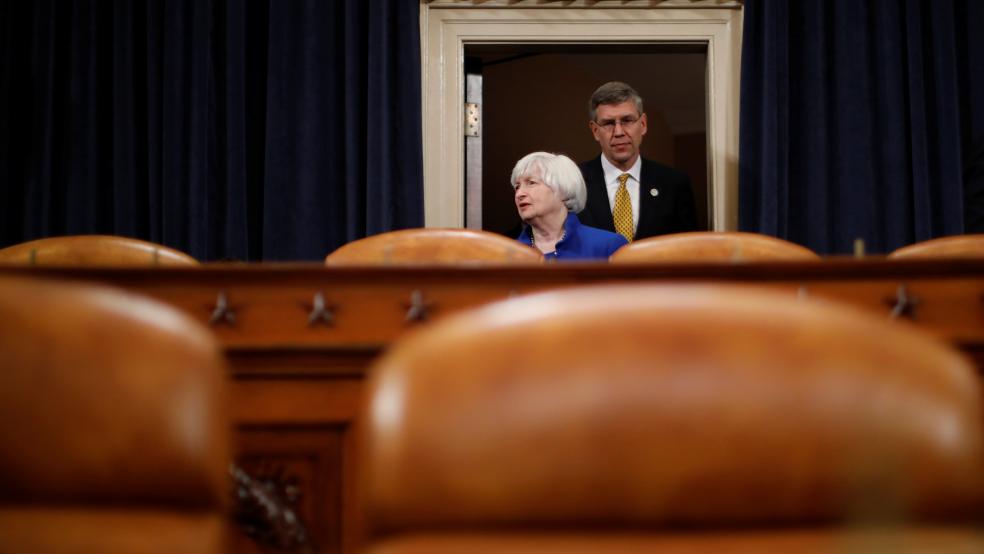Daniel Tarullo announced on Friday that he is resigning from the Federal Reserve Board of Governors in early April, nearly five years before his term expires on January 31, 2022. Governor Tarullo, who was appointed by President Obama in 2009, led the effort to plug the holes in financial regulation that allowed the housing bubble and financial panic to occur. So his resignation comes at an inopportune time for those of us worried about Trump’s plans for wholesale deregulation of the financial sector and the vulnerability to another financial crisis that comes with it.
Trump could also have a large impact on how the Fed conducts monetary policy. With Governor Tarullo’s departure, three of the seven seats on the Board of Governors are open (two of Obama’s nominees were never confirmed), and Janet Yellen’s term as Fed Chair ends on February 3, 2018. Although she could stay on the Board until her term ends on January 31, 2024, traditionally when a new chair is appointed, the current Fed chair resigns (this opens up a position on the Board for the new chair, but with three open positions that tradition may not be honored).
Related: Trump Has a Chance to Remake the Federal Reserve
Beyond that, Stanley Fischer’s appointment as Vice-Chair ends in June of 2018 and his term ends in January of 2020. Like Yellen, he could stay on until his term ends but there is no guarantee that he will. And, of course, there could be other resignations as well. I fully expect Trump will be able to appoint at least five of the seven Fed Governors by the end of his first term.
With a Congress that seems ready to rubber stamp his choices for important government positions rather than fulfill its “advise and consent” role, the conduct of monetary policy could change dramatically. If Trump politicizes the Fed, for example, by stacking the Board with people who will attempt to implement whatever policy he desires, the Fed could be permanently damaged.
Both Obama and Bush were able to appoint all of the members of the Board of Governors by the end of their second terms. The Board of Governors constitutes a majority of the twelve member committee that sets monetary policy, and the ability to stack the Board gives individual presidents far more influence over monetary policy than was intended when the Federal Reserve System was set up (if all Governors serve their full 14 year terms, a president can only appoint two of the seven Board members in a four year term, four of seven in two terms).
The fact that both Obama and Bush were able to stack the Board did not raise huge concerns since both nominated competent people and both respected the Fed’s independence. That’s not to say that there were no concerns at all. As noted above, for example, during both the Bush and Obama administrations some nominees were not confirmed (including a Nobel prize winner nominated by Obama whose qualifications were not in doubt).
Related: Top Federal Reserve Official Resigns as Bank Deregulation Looms
But despite the ideological differences over monetary and regulatory policy that led to these confirmation difficulties, Federal Reserve policy has been relatively consistent and effective from administration to administration over the last several decades. This is due in no small part to politicians respecting the Fed’s independence.
Trump has already shown he has no respect for traditional political boundaries, and that being qualified is not a necessary condition for being appointed to fulfill an important role in his administration. Loyalty is all that matters. If Trump wants to, he will be able to stack the Fed with people, qualified or not, who will implement the monetary and regulatory policies he desires. Given his evident lack of knowledge about monetary policy – for example, he has said “Bringing back the gold standard would be very hard to do, but, boy, would it be wonderful” – that could be a disaster.
Can he be stopped? The first line of defense, the advise and consent role of the Senate, has already been compromised, and Trump is in the process of doing his best to mute a second line of defense -- the influence of economists. So far economists are conspicuously missing from his administration. I don’t expect the objections of economists to matter at all to Trump or to the Republicans in the Senate who must approve his nominations.
Related: Populist on the Trail, Trump Pivots Toward the Banking Industry
That leaves the media and the public. Objections from the “mainstream” media won’t matter any more than the objections of economists and the media Trump depends upon will support him in any case. So there’s not much hope there either. As for the public, the people Trump cares about have been so misled about the Fed and the important role it played during the financial crisis and Great Recession that they will likely cheer whatever he does.
So long as Janet Yellen is still at the helm of the Fed, the institution has some protection. She has the authority to control the agenda at monetary policy meetings and prevent bad proposals from seeing the light of day. But her term as chair is over in less than a year and I don’t expect Trump to reappoint her. I hope I am wrong, but my fear is that her departure will be the end of the Fed as we know it, and the beginning of a Fed stamped with the Trump brand name in big “gold standard” letters with him as the CEO. That will irreparably compromise – bankrupt if you will – the Fed’s independence and its ability to conduct effective monetary policy.






